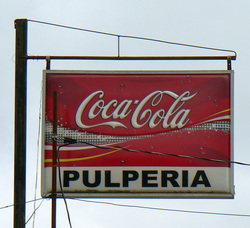 Two worlds in a forced collision... Day 16 in Ocotal June 12, 2012 With two full weeks under my belt in Ocotal, I am beginning to reframe my expectations about what ¨value add¨ could look like and I am OK with what I see. But thoughts at this time of writing are shaped by something much more mundane: a pair of old, clean and wet white underpants brought to the table of a company picnic and a discarded, pale blue party dress used to wipe the face of a child. Both acts completely natural, with no forethought other than an immediate need for a rag in both situations - and both worked just fine. And I thought about how the lens we use shapes our reactions to what we experience, what we see (and choose to see) and how we react to it. 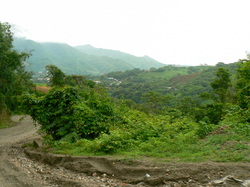 Not untypical stretch of road en route to Quilali Last week, we drove about 7 hours to deliver a 90-minute workshop on citizenship in Quilali, a small, country town in Las Segovias high in the hills along a road that is sometimes paved, sometimes not but pretty much always steep and rough. Gorgeous countryside, sadly marred by huge tracts of deforestation. There is a lot of finger-pointing for this travesty: locals blame the Americans, pro-liberal websites blame over-generous and poorly managed rights given to foreign companies by the government, partly out of a real necessity to repay debts and ensure investment dollars. In addition, the situation is compounded by the local population since most cooking is done on wood-burning stoves and land for agriculture is essential in a rapidly growing population. Add to this the need to push the coffee plantations further and further up the mountain to find the cooler climate the crop needs (i.e. a response to global warming) and you have the recipe for disaster - complete deforestation in 20 or so years at the current rate of 1.5% per year. Only 20% of Nicaragua is currently covered by rain forest, the largest tract in all of Central America. 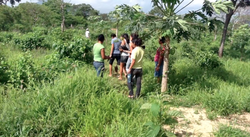 Tree planting on the campus of ILLS This is probably why the institute (ILLS) where I am volunteering is planting trees around it's buildings: nature's air-conditioning and a reminder to its students that their leadership includes care of the evinronment. Click on he photo to the left for a short video showing some of the students planting trees. But back to our trip to Qulali. We had to stop half-way to our destination because of a clutch that failed (little wonder on these roads). While our driver took a lift with a friend to the nearest mechanic (some 20 minutes say in the next town) we waited and drank coffee in a local store - coffee is brought out at every opportunity for guests - and I sat outside and watched the activity on the street. A rich and varied mixture of vehicles, people and animals. I have compiled a short slide show of some of the shots at this link: the remains of a broken egg for a dog's breakfast, a branch to replace a broken stand on a bicycle, a piñata for a child's birthday, fish sold by a door-to-door salesman out of a cooler carried on his head... 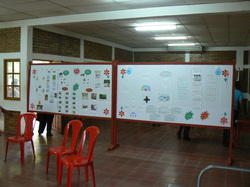 Dividing walls us between us and them We eventually got there, about 2 hours late, though this was clearly not a problem for the participants. Time takes on a different dimension in this part of the world - not that I have even begun to understand what is acceptable and what is not. I smiled when I saw the room. We were using the meeting room associated with the town hall, a strange meeting of worlds: local politicians ultimately controlling the municipal budget, a group of mostly indigenous citizens and a non-profit instiute teaching the citizens how to demand their rights for information and budget oversight. Strange bedfellows. And I chuckled when I saw the wall separating us from the town politicians meeting in the same space. Hardly up to a professional US-company's standards for sound-proofing, but completely acceptable and normal in the context of a training session in Quilali. And I thought about the conversations and complaints I had overheard in my time in my old job and I smiled. It all depends on the lens you choose to look through. 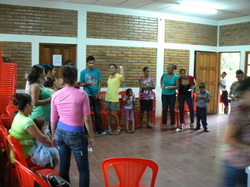 Participants at our workshop I changed the lens again when I watched the participants. An enthusiastic group of women, a few men and a smattering of children (lovingly called "chavalos" or "chavalas" in Spanish). Between breast feeding, a screaming child, the meeting "next door" and the coming and going of local town people in what is essentially a public space, I thought about my frustrations with trainings in luxury hotels in city centers: participants who are tethered to a Blackberry as though their life depended on it, banquet staff interrupting to bing in bottled waters or chairs that don't have wheels...and I am glad I am able to change the lens, if only for a while. And I wonder how long I can hold on to this different lens. The group has been meeting since November. The overall workshop goals are increasing citizen participation and oversight of the municipal budgeting process, with connections to the rights of women and youth and access to information. And the facilitators and institute are serious about teaching this in a nonpartisan way. 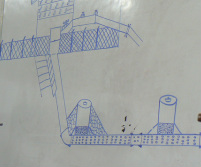 The "pozos" in the river Like the best designed training programs, we had a perfect situation to apply the new skills of carrying out a social audit of a budgeted project of the municipality. The incomplete installation of a drinking water supply. Water is drawn from the river, pumped to a filtration system and pumped into a huge tank on top of the highest hill close to the town. In a country as wet as Nicaragua, no matter whose lens I use, I can not fathom that only 60% of the rural population has access to water (almost half of the polputaion lives in the country) and only 27% of those households have running water. 0% of the rural population has access to a sewage system. In the middle class house I live in, we get water 3-4 days a week and store this in a huge vat in the garden. Clothes are washed and the garden watered on those days when we get water. As usual, the conversation about the water supply was rich as we brainstormed what steps should be taken to complete the social audit of the town councils performance. A follow-up session was agreed to role play the meeting with the town council. for next week. And the citizens expressed their side of the story (they just want the water they were promised). And the engineer told his side of the story (pointing fingers at the people who constructed the "pozos" that are used to draw the water from the river bed) and a relatively rich farmer's wife expressed her opinion over a cup of coffee in her very middle class house (blaming the whole thing on corruption of the very officials we had been sharing our training room with, on the other side of our "air wall"). So many lens... 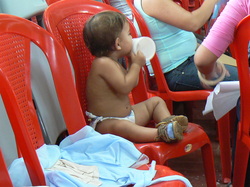 But I should really come back to that discarded, blue party dress and someone's recycled underpants before I close for the evening. The dress (in the picture on the chair to the right of the child), discarded because of the heat and used to wipe her mucky face after lunch. And the tidy-whities brought out to wipe our hands at the end of a meal to celebrate a birthday and my arrival - in the yard of one of the institute's team (a veritable feast cooked on wood burning stoves, covered against the incessant flies, served by a local cook who does the rounds of social events). A party dress and underpants - two gestures with which I am both charmed and fascinated, at least while I use my current lens.
4 Comments
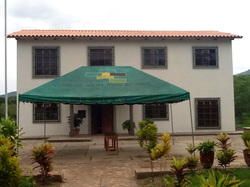 Main administration building of ILLS Day 5 in Ocotal June 1, 2012 There is a Bhuddist saying that goes something like this: "When the student is ready, the master appears." I am not sure I know what "ready" looks like, but I have a sense that a master has certainly appeared, or rather a series of masters. In Spanish the word "Maestra" has none of the contemporary connotations associated with "mistress" in English, and since most of the "masters" are women at the Instituto de Liderazgo de Las Segovias (ILLS), I apologize for this shortcoming in English! At the institute I am volunteering for a team of dedicated and strong women, and as usual, I am aware how women catalyze social change in so many countries. While I continue to learn about the goals of this young institution, my first exposure is to observe a workshop designed to help community leaders participate in local government so they can leverage relatively new (2003) legislation about citizen participation in local development and infrastuture projects. This a textbook casestudy in democracy in action. I, sadly, have never participated as a citizen in any government, having always been a foreigner in someone else's country since the age of 18. A "resident alien" in the USA for almost 25 years until last July, I will be participating in the upcoming elections as a citizen for the first time (albeit via Email). And it is strange that I am getting my first real lesson in citizenship in the poorest country in Central America where the issues faced by these community leaders feel both both immediate and on a human scale, for example: a bridge that will connect two halves of a community that straddles a river in both the dry and rainy season, or; providing drainage channels on the sides of roads so that they are not washed away by storms, or; the provision of latrines. The sorts of things that I have never had to think about in my life can seem overwhelming and out of reach to a population that has none of these basic facilities. And I learn. On another morning, I join a search for pictures of a group of children with various physical disabilities who had received medical attention from visiting Spanish surgeons in 2010. These doctors wanted to learn of the progress of the children as they plan their return. Since no obvious organization seemed to take this task under its wing, it fell to the masters of the institute to do some sleuthing to track them down. Fortunately, an organization that provides for mentally and disabled children - Los Pipitos - had many of the photographs we needed. For the others, we would need to track the addresses from the local hospital and go out and take photos. No simple task. There is only one hospital in the region for more than 200,000 people. 200 beds, many of which are frequently shared by two or three patients. Thanks to immaculate patient records, all hand-written (no computer is used in record keeping), we track down every address we need for the 6 or so remaining children. And I think back to a training solution I co-designed for a major US provider of patient-management computer systems and software for hospitals, and I struggle to rationalize the contrast in my mind between these two experiences. And I try to learn. With the address of one specific child in hand (i.e. 3rd house on the street SW from the dining room of the orphanage in the next suburb - hardly GPS-friendly!), we tracked our way to the house, where no one had heard of the child. Knocking on the doors of some nine houses in the neighborhood, we still found no trail to our missing child. Could he have come from one of the remote villages and stayed over in someone's house prior to and after the operation? By chance, one man had heard of the child and led us to the house. The roads, though intentional, were more or less a series of interconnected ruts between houses, clearly impassable in anything less than a four-wheeler, on foot or by an intrepid cyclist (not that we saw many!) Wrong child, but he had indeed had an operation in 2009, from doctors for a similar condition - close enough to transmit back to the doctors to assure them their work was valuable. There is a short video of the happy child at this link. En route, we talked to our guide about the condition of the road. His shrugs and resignation to the permanent condition spoke to the challenge of building active citizenship, even in a country that has known democracy for some years. Engagemet of the citizens themselves in the process, the very thing the 2003 law has as its primary focus. I had read the law, read impressive printed guides that simplified the legal text into real examples of application, looked at full-color wall planners with key annual target dates and attended a leadership training designed to oil the wheels of participation. And yet, the very citizen who stands to benefit most shrugs and lacks something they call "gestión" here in Nicaragua - a diligence to actively pursue something. And I learn some more. I had been impressed by the building and the apparent organization at Los Pipitos - a true haven in the city of Ocotal - so I looked up their site when I got home. Clearly well organized, they are the destination for an organization that provides cultural tourism and volunteering opportunities - all inclusive packages targeting for students (a minimum stay of 8 weeks work well for college vacations) and others that include language training, meals, accommodation and volunteer opportunities for relatively wealthy travelers (at $3245 for 8 weeks plus flights, it's not a cheap vacation!) I did this once, in Ghana, for just two weeks. One of the most challenging times of my life. On that trip I learned what I was not cut out to do! Though clearly a different experience, I struggle again to understand a system:
I layer into this struggle in my mind and heart the experience of my flight from Atlana to Nicaragua where at least three religious groups or 50% of the flight ("Jesus Teams" as proclaimed by one group on their bright yellow T-shirts) were taking advantage of the long weekend to "make a difference" (as proclaimed by another team's bright orange T-short). I have no idea what they paid, but I know I was offered $750 to delay my departure by one day. I was tempted. And I listen, and I try to learn and I wonder. |
BackgroundI sold house, car and most of my furniture to move to the small town of Ocotal in Las Segovias on the Honduras/ Nicaragua border. Archives
March 2014
Categories |
Contact© Copyright 2018 Richard Richards, Bournemouth, Dorset, UK
|

 RSS Feed
RSS Feed
